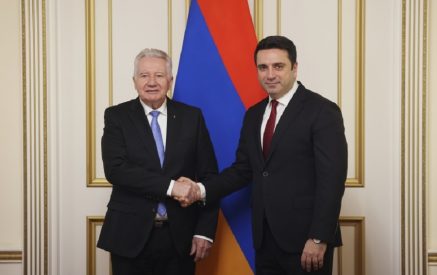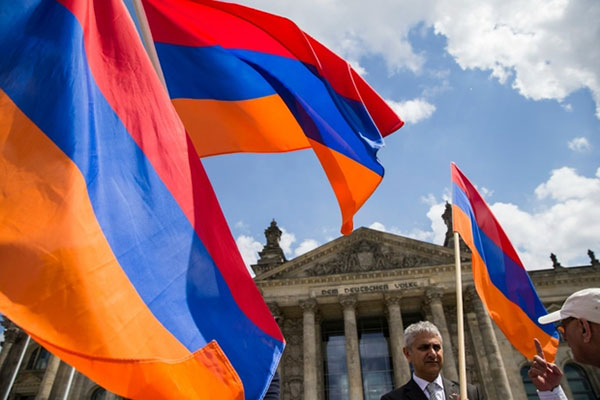middleeasteye.net. Observers say vote may endanger Turkey’s Armenian minority, derail fragile migrant deal with Europe
ISTANBUL – Fallout from the German parliament’s vote to recognise massacres of Armenians in 1915 as “genocide” may adversely affect Turkey’s migrant deal with Europe and even put Turkey’s Armenian citizens at risk, analysts say.
Turkey was quick to react to the vote on Thursday, with Ankara recalling its ambassador to Berlin for consultations hours after the resolution passed.
This bill, put forward by Germany’s ruling left-right coalition and the opposition Greens, is titled “Remembering and commemorating the genocide of Armenians and other Christian minorities in 1915 and 1916,” and carries the contentious word throughout the text.
The timing of the motion took observers by surprise, in light of negotiations currently underway between the EU – driven by Germany – and Turkey over how to control the flow of migrants from the Syrian conflict.
The EU and Turkey are also mired in talks over Ankara’s long wished-for accession to the 28-member union.
Defining the mass deaths of Armenians and other Christians in 1915 as genocide is one of Turkey’s biggest foreign-policy headaches. Ankara has attempted to use its clout to prevent legislatures of various countries from passing bills that would define it as such.
The two countries that matter most for Ankara in this context are the US and Germany. The US has never gone further than calling it “Meds Yeghern” or “Great Tragedy”, a decision believed to be in large part because of the strategic importance of ties with Turkey.
Ahmet Kasim Han, professor of international relations at Istanbul’s Kadir Has University, said the German vote represents yet another foreign policy failure for Turkey: The move will not only deal a blow to Turkish-European relations in the long term, he told Middle East Eye, but will also worsen the Turkish government’s polarising and isolationist practices at home.
“It is tough to see it as anything other than a foreign policy failure,” Han said. “For decades, Turkey has worked to prevent this definition from being accepted in the US and Germany especially, and yet now we have this.
“The fallout will not be limited to bilateral ties, but will extend to Turkish-EU ties because Germany is the key driver in Europe and Chancellor Angela Merkel has been instrumental in revitalising Turkish-European talks.”
The timing of the vote, Han said, could be attributed to Merkel’s opponents, who see it as an opportunity to erode her domestic standing, with both the German and European publics angered by her recent overtures to Turkey.
An abrupt end to ties between Turkey and Europe is unlikely, he said. But at home, it will offer the Turkish government another club with which to beat its opponents.
“This government will use [the vote] as part of its isolationist and polarising policy repertoire. All those from the pro-European, secular and modern sections of Turkish society who promote ties with Europe will be attacked for seeking ties with countries that refer to Turks as committers of genocide.”
Friendship test
Prior to the vote, recently appointed Turkish Prime Minister Binali Yildirim said the friendship between the two countries would be put to the “test,” but he was keen to emphasise that cooperation with the EU would not cease.
“We are loyal to the agreements we have made. The EU should stand by its word in the same way,” Yildirim said ahead of the vote on Thursday. “We are not a tribal state, we are the Turkish republic, a country with a deeply rooted traditions,” he told members of his Justice and Development Party (AKP).
Turkish Prime Minister Binali Yildirim addresses reporters during a press conference (AFP)
After the passing of the bill in the German parliament, the Bundestag, Turkish President Recep Tayyip Erdogan reacted from Nairobi, during a four-day visit to Africa.
“I spoke to the prime minister. Our joint decision was to recall our ambassador for consultations as a first step,” Erdogan told a news conference.
“This decision by the German parliament may seriously affect German-Turkish relations. We will evaluate the situation after I return. It is then that we will take the steps that really need to be taken,” he said.
His response will be the ultimate gauge of Turkey’s reaction.
A migrant deal reached between the EU and Turkey on 18 March is already under strain as Ankara has threatened to review it if another agreement regarding visa-free travel for Turkish citizens to the Schengen (EU) area is blocked.
At such a critical time for Turkish-German relations, the absence of Merkel and most cabinet ministers from the vote could be a deft move that prevents relations being completely derailed.
AKP spokesperson Yasin Aktay, however, said Merkel’s absence was nothing more than a sign of ineffective and weak leadership, calling the vote “an open attack and insult to Turkey”.
“This is a totally irresponsible and inhumane action on the part of the German parliament,” Aktay told MEE. “Politicising the pain and deaths of so many people is an insult to the memories of those who died.”
Aktay said that, regardless of how the Turkish government responds, the Turkish public’s emotional bonds with Europe have been severed.
“First of all, why don’t they even stop to think of the Muslims who died during that period? Their numbers were far larger,” he said.
“Our president, Recep Tayyip Erdogan, was sincere when he expressed regret for all those who died back then, including Christians and Muslims.
“This is one more insincere act that cuts our nation’s emotional ties with Europe. The same thing happened with their games regarding the deal on visa-free travel for our citizens.”
The Republic of Turkey has always rejected the use of the term genocide to describe the events of 1915, during the final years of the Ottoman Empire, and has repeatedly called for the archives of both Turkey and Armenia to be opened to neutral scholars for study.
Apart from the Peoples’ Democratic Party (HDP), the other parties in the Turkish parliament – the Republican People’s Party (CHP) and Nationalist Movement Party (MHP) – are also opposed to any statement referring to the incidents of 1915 as genocide.
After a breakfast meeting with EU ambassadors on Wednesday, CHP leader Kemal Kilicdaroglu said he warned the ambassadors against turning what he termed “the so-called genocide” into a political issue. He said he had informed them that he believes it is a historical matter, and that Armenia should open its archives as Turkey has done.
’German recognition vital’
Yetvart Danzikyan, editor-in-chief of the Turkish-Armenian weekly newspaper Agos, told MEE that Germany’s recognition of the 1915 events as genocide is poignant, but warned that the backlash in Turkey may be unpredictable.
“It is not easy to predict Turkey’s response. But it is a vital vote because Germany was a close ally of the Ottoman Empire at the time of the genocide, so they will have a lot of documentation on it,” he said.
Danzikyan said he could not rule out the backlash going as far as attacks on the Armenian community in Turkey, but insisted that it is too early to predict.
“It all depends on how Turkey reacts from the top. Anything can happen,” Danzikyan said.
In 2015, on the centenary of the mass killing of 1915, Ankara recalled its ambassadors from several countries, including the Vatican, for referring to the events as genocide. However, Ankara refrained from recalling its ambassador from countries with which it had more significant ties, including Russia.
In the same year, Germany shelved a similar bill due to be put to a vote in its parliament.
“It is a good step that Germany has now recognised this,” Danzikyan said. “It means that the policy of denial Turkey tries to impose on everyone is no longer working.”




















































